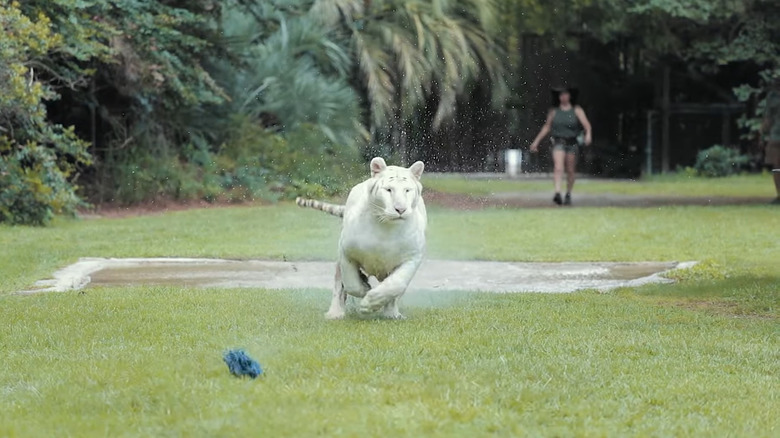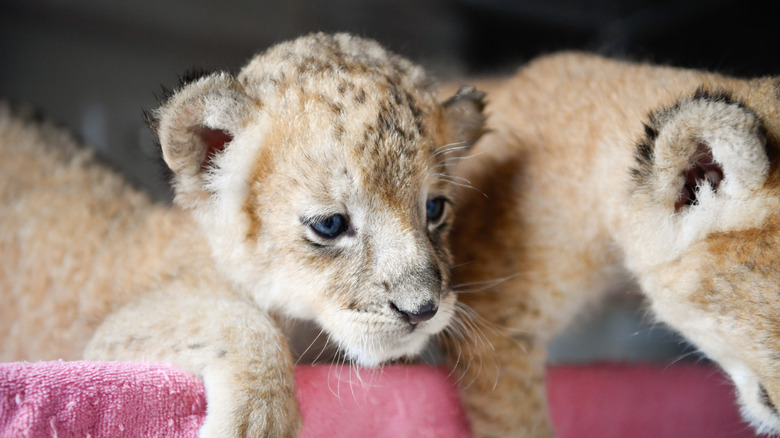The Upsetting Reasons You May Want To Avoid The Myrtle Beach Safari
Wild animal-based entertainment has existed as far back as the gladiator fights in ancient Rome. However, the current climate has brought the morals of both using animals for entertainment and keeping them in captivity into more scrutiny. Circuses, aquariums, zoos, and so-called "roadside zoos," like the one formerly owned by Joe Exotic, have started to make changes. These include eliminating animals from performances altogether or recreating their natural environment in enclosures. However, some animal attractions still have their skeptics.
While these organizations are open for visitation all over the United States, the captives of the popular Myrtle Beach Safari in South Carolina have gained positive and negative attention. Instagram videos of wild animals swimming with members of the safari's staff or drinking from Perrier bottles have thousands of views. While the activities in the videos do not inherently mean that the animals are not receiving proper care, the organization has come under fire for how it acquired some of its residents and for getting them too close to staff and safari guests. These issues might make tourists wonder if there are better budget-friendly activities on South Carolina's coast.
Chimps at Myrtle Beach Safari are almost like pets
Some of Myrtle Beach Safari's staff have posted videos of chimpanzees in human living spaces, and they appear like domesticated pets. Upon seeing one of these videos with a chimp scrolling on a cell phone, primatologist and PhD candidate at the University of Kent, Adriana Lowe, expressed concerns. "Chimps make dreadful pets—they're intelligent social animals whose needs are difficult to meet, even in a setting like a good quality sanctuary," Lowe explained to Ape Alliance. In response, famous animal trainer Kody Antle of Myrtle Beach Safari told Ape Alliance that the chimp in the cell phone video is "an animal ambassador connecting peoples hearts and minds to the wonder of chimpanzees and the plight they face in the world." He further explained that chimps at the safari have plenty of interaction with each other and access to healthy outdoor environments.
Another issue with Myrtle Beach Safari concerns the nonprofit Rare Species Fund, founded by the safari's owner, Doc Antle. Its goal is to support wildlife conservation initiatives all over the globe. However, Myrtle Beach Online reported that significant amounts of money seem to go toward caring for the animal ambassadors. Additionally, conservation organizations that received funding appeared in social media posts but not on the organization's website or in public reports when Myrtle Beach Online conducted such research.
Myrtle Beach's founder illegally purchased lion cubs
In 2023, Antle was convicted of laundering money from an illegal immigration operation over the United State's border with Mexico. The safari founder also pleaded guilty to wildlife trafficking after purchasing lion cubs. U.S. Customs and Border Protection defines wildlife trafficking as "the harvesting and selling of wildlife, and wildlife products." Ivory from elephant tusks is a prime example. Antle's purchase of lion cubs also brings up debates surrounding cub petting. This is when members of the public pay to spend time with cubs of wild animals, which is allowed at Myrtle Beach Safari. Many wildlife sanctuaries like Wild Cat Sanctuary are against cub petting because, oftentimes, these cubs are taken from their mothers much too soon, or they have unnatural genetics from cross-breeding. Therefore, they do not aid in conservation efforts.
When looking into visiting a zoo or another type of wildlife organization, conduct your own research beforehand. There are wonderful wildlife sanctuaries for animal lovers that operate similarly to rescue organizations, meaning they take in animals (usually adults) that cannot be released into the wild for various reasons. Some examples include Yellowstone Wildlife Sanctuary in Montana and Turpentine Creek Wildlife Refuge in Arkansas.

